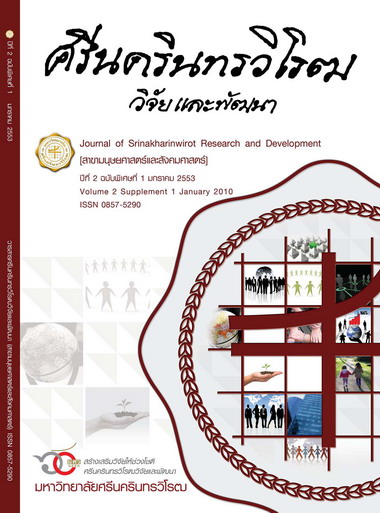โครงการพัฒนาบทเรียนออนไลน์ด้วยวิธีการเรียนรู้ด้วยการนำตนเองของนิสิตวิทยาลัยนวัตกรรมสื่อสารสังคม (THE DEVELOPMENT OF WEB-BASED LEARNING BY SELF-DIRECTED LEARNING OF STUDENTS IN COLLEGE OF SOCIAL COMMUNICATION INNOVATION, SRINAKHARINWIROT UNIVERSITY)
Keywords:
Web-based learning, Self-directed learning, Learning efficiencyAbstract
บทคัดย่อ การศึกษาวิจัยนี้มีวัตถุประสงค์ 3 ประการ คือ 1) เพื่อจัดทำบทเรียนออนไลน์ที่มีประสิทธิภาพตามเกณฑ์ 80/80 รายวิชาการตลาดเบื้องต้น 2) เพื่อศึกษาผลสัมฤทธิ์การเรียนรู้ด้วยการนำตนเองของนิสิตวิทยาลัยนวัตกรรมสื่อสารสังคม มหาวิทยาลัยศรีนครินทรวิโรฒ รายวิชาการตลาดเบื้องต้นโดยการเรียนการสอนผ่านบทเรียนออนไลน์ก่อนเรียนและหลังเรียน 3)เพื่อศึกษาความพึงพอใจของนิสิตวิทยาลัยนวัตกรรมสื่อสารสังคม มหาวิทยาลัยศรีนครินทรวิโรฒ ที่มีต่อการใช้บทเรียนออนไลน์รายวิชาการตลาดเบื้องต้น ดำเนินการวิจัยโดยสร้างและพัฒนาบทเรียนออนไลน์ให้มีประสิทธิ ภาพตามเกณฑ์ 80/80 ด้วยการวิเคราะห์สภาพการณ์ การออกแบบบทเรียน การสร้างสตอรี่บอร์ด การสร้างบทเรียน การตรวจสอบและประเมินคุณภาพบทเรียนออนไลน์โดยผู้เชี่ยวชาญ และการหาประสิทธิภาพของบทเรียนโดยนำบท เรียนออนไลน์ไปทดลองจัดการเรียนการสอนกับกลุ่มตัวอย่างซึ่งได้แก่นิสิตวิทยาลัยนวัตกรรมสื่อสารสังคมมหาวิทยาลัย ศรีนครินทรวิโรฒ โดยวิธีสุ่มตัวอย่างแบบง่ายจากประชากร และนำข้อมูลที่ได้รับจากการทดลองมาตรวจสอบหาประสิทธิภาพของบทเรียนให้ได้ตามเกณฑ์ 80/80 ผลการวิจัยสรุปได้ดังนี้ 1) ผลการหาประสิทธิภาพของบทเรียนออนไลน์ด้วยวิธีการเรียนรู้ด้วยการนำตนเองของนิสิตวิทยาลัยนวัตกรรมสื่อสารสังคม รายวิชาการตลาดเบื้องต้นที่ผู้วิจัยพัฒนาขึ้นพบว่า มีประสิทธิภาพเท่ากับ 94.14/90.09 ซึ่งสูงกว่าเกณฑ์มาตรฐานที่กำหนด 80/80 2)ผลสัมฤทธิ์ทางการเรียนของนิสิตวิทยาลัยนวัตกรรมสื่อสารสังคมเมื่อเรียนบทเรียนออนไลน์ด้วยวิธีการเรียนรู้ด้วยการนำตนเอง รายวิชาการตลาดเบื้องต้น หลังการเรียนมีระดับคะแนนเฉลี่ยสูงกว่าก่อนเรียนอย่างมีนัยสำคัญทางสถิติที่ระดับ 0.01 3) การศึกษาความพึงพอใจของนิสิตวิทยาลัยนวัตกรรมสื่อสารสังคม มหาวิทยาลัยศรีนครินทรวิโรฒ ที่มีต่อการใช้บทเรียนออนไลน์รายวิชาการตลาดเบื้องต้น ผลการวิเคราะห์สามารถตอบสมมติฐานข้อที่ 3 ได้ว่านิสิตวิทยาลัยนวัตกรรมสื่อสารสังคม มีความพึงพอใจต่อบทเรียนออนไลน์ด้วยวิธีการเรียนรู้ด้วยการนำตนเอง รายวิชาการตลาดเบื้องต้นอยู่ในเกณฑ์ระดับมาก และพบว่านิสิตมีความพึงพอใจในระดับมากในทุกๆ ด้าน ได้แก่ ด้านการจัดกิจกรรมการเรียนการสอน ด้านเนื้อหาสาระรายวิชาการตลาดเบื้องต้น ด้านเว็บไซต์สำหรับการเรียนการสอน และด้านอื่นๆ
Abstract
The purposes of developing online lessons for undergraduate students of Social Communication Innovation College are as follows: 1) to evaluate the efficiency of the online lessons for Fundamental Marketing course whether they were congruent with the 80/80 criteria. 2) to compare the results of achievement scores prior to and after taking the online lessons. 3) to assess students’ satisfaction with the online lessons. The process of research is to create and develop efficient online lessons due to 80/80 rule by analyzing situations, designing lessons, building story board, checking, and assessing quality of online lessons by specialists, and searching for efficient online lessons by employing them with a groups of students. The sample of this study selected by using simple random sampling are the students of Social Communication Innovation College, Srinakharinwirot University. The method used to examine the efficiency of the online lessons is based on 80/80 criteria. The results of the research are as follows: 1) The efficiency of the online lessons for Fundamental Marketing course is 94.14/90.09, which is higher than the standard based on 80/80 criteria. 2) After employing the online lessons, the students’ average scores increased significantly at 0.01 level. 3) The analysis of the satisfaction of students of Social Communication Innovation College, Srinakharinwirot University, to Fundamental Marketing online lessons can attempt to answer the third assumption that students benefit from self-learning of online lessons. Students also appreciate the activities and lessons provided when studying online lessons for Fundamental Marketing.
Downloads
Downloads
Published
How to Cite
Issue
Section
License
Srinakharinwirot Research and Development Journal of Humanities and Social Sciences is licensed Under a Creative Commons Attribution-NonCommercial-NoDerivs 4.0 International (CC-BY-NC-ND 4.0) License, Unless Otherwise Stated. Please Read Journal Policies Page for More Information on Open Access, Copyright and Permissions.



